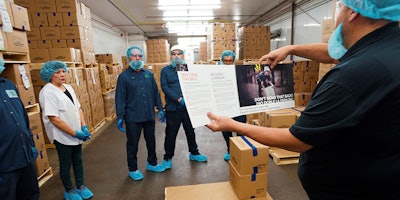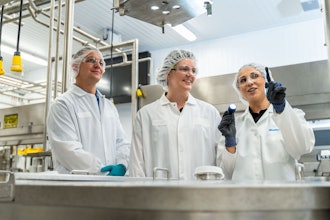
 Holly Mockus, Product Manager, Alchemy Systems
Holly Mockus, Product Manager, Alchemy SystemsFood safety training has made great strides in the last several years — especially in onboarding — as more companies recognize the role strong employee engagement plays in successful training programs.
Yet, a big opportunity still exists to increase engagement and ensure initial training is applied long after onboarding is finished: refresher trainings. These reinforcements can be delivered in several ways, and should be designed to maximize effectiveness and minimize time off the floor.
Holding short learning sessions (5-7 minutes), or “bursts,” that reinforce initial onboarding keeps key concepts top of mind by creating a continuous learning environment. Among most food manufacturers, however, finding the time for refreshers is easier said than done. According to the latest Global Food Safety Training Survey, the top three food safety training challenges are scheduling time for training, verifying effective training and organizing refresher training.
Finding the time for training is always a significant challenge, as it often cuts into production hours. This is one reason why many training programs rely heavily on onboarding to deliver key safety concepts. Unfortunately, this “spray and pray” method of training, which amounts to showering the employee with important messaging and hoping it sticks, means some critical information may slip through the cracks. Refresher training that repeats and reinforces knowledge is more likely to remain “fresh” in the minds of employees, resulting in smart action at work.
It’s not surprising that the same research also finds that “late or lack of refresher training” is among the most frequent training deficiencies cited in audits. To combat this, forward-thinking companies are looking beyond traditional one-way methods of training to using multi-channel methods, like breakroom videos and mobile supervisor coaching apps.
The Global Food Safety Training Survey also reports that more than three quarters of food companies still rely on written materials to train frontline employees. Unfortunately, this method is often ineffective because today’s workforce learns differently. Modern workers rely on technology and digital tools for gaining knowledge. They experience more distractions, and learn best when made to interact by demonstrating understanding.
A multi-channel approach that incorporates refresher training is your best bet. Effective reinforcement can be conducted in several ways:
- Mini-videos played on a continuous loop in breakrooms and other high-traffic areas.
- Eye-catching, multi-lingual posters that rotate to feature known trouble areas.
- “Huddle guides” that offer pre-written scripts for supervisors to emphasize important concepts before or during shifts.
- Mobile coaching tools that equip supervisors with pre-scheduled “observations” to verify — and reward — correct behaviors.
The sum result of these refreshers is magnified when each component is coordinated to the same topics and visual cues.
“We use posters, digital videos and huddle guides, along with monthly training, to really reinforce topics that we cover and drive the safety culture throughout our organization,” said Amanda Moss, human resources manager of food manufacturer Chudleigh’s.
Chudleigh’s isn’t the only food manufacturer seeing success from a continuous learning environment. When Green Valley Pecan Company implemented regular refresher trainings, the company experienced a 17 percent increase in training retention across its workforce. More importantly, it saw a 36 percent increase in knowledge retention among workers who needed it most. Overall, leading companies that incorporate refreshers into their training programs see the best results.
Holly Mockus is a Senior Product Manager at Alchemy Systems



















